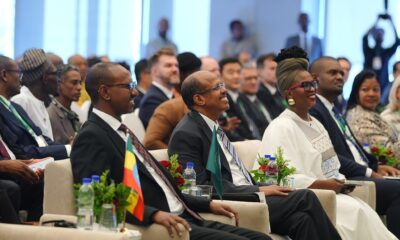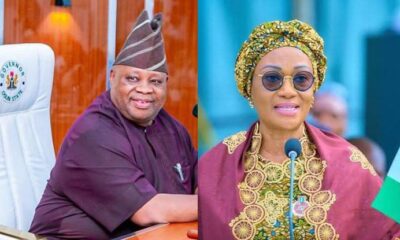Political Issues
The Teachable Lessons of the March 28 Nigerian Presidential Election -By Adewale Ajadi

Across the world in the past few hours, there has been quite unyielding focus on the result and lessons of the Nigerian Presidential elections. If you do not know that in Nigeria we have a President-elect, General Muhammadu Buhari (Rtd.), I welcome you back to earth. While you were away the incumbent, now outgoing president, gave a last minute concession that many believe rescued the country from a drawn out legal and possibly extra-legal conflict.
My initial reflections on the election are that we had the good, bad and ugly play out, but as it often happens, in spite of ourselves, we got the kind of result we could only hope for but are not sure we deserve to have. If you remember the 2012 African Nations Cup, when the Super Eagles won the cup under coach Stephen Keshi, well we seemed to have won in spite of initial underperformance. The flashes of cohesion and sheer resilience could not mask the inconsistency, as well as lack of coordination or strategy. It seems in a similar way many say the incumbent President is a hero and a statesman; in fact some even talk of a Nobel nomination for him. They overlook how the process played out.
The election, delayed for six weeks on what many believed to be self-serving grounds, did not just create political uncertainty, but had negative economic consequences. The special agony of prolonged negative campaigns poisoned the public mood and space. The unrelenting spectacle of billions of Naira and Dollars disbursed for political office in a country where a fraction could restore many essential services, including much-needed healthcare for millions.
Also, there was the unfortunate choice of the organised purveyors of violence as benefactors of large chunks of the commonwealth. On the other side, the sheer audacity of the Independent National Electoral Commission (INEC) in changing the process, pioneering technologies and facilitating implementation across 119,972 polling units. We, in many ways, lived through an epic which, no doubt, was imbued with all manner of human intrigue, of which none played out more publicly than the meltdown of the erstwhile Minister of the Niger Delta, Elder Orubebe.
When the history of this election is written, it is unlikely to acknowledge the concession of President Jonathan to his challenger, not because it was not useful or helpful. In fact a few months before, at the end of the Ekiti election, the then Governor of the State, Dr. Kayode Fayemi had given a concession, which was celebrated as unprecedented. In the same way the newspapers, social media and public spaces were filled with heroic appraisal. Many have now forgotten the event or its pioneering import. We are quick to deify heroes and equally as fast to jettison them. The question on my mind is, ‘what will be remembered through the ravages of time’? What lessons will be sustainable and retained in the systemic memory? It seems to exempt many acts of individual improvisation. For example when would a future President concede? Would it be after all hope is lost? When other ex-Presidents plead or when he or she is sure that the country is on the brink of catastrophe?
Compare that with the response of the INEC Chairman to the tantrums of Elder Orubebe. The process involved was clear and stuck in my memory. A public release of collated results, with the exception of those suspended as a result of complaint(s) duly filed and acknowledged before the announcement begins. In spite of this, whether pre-planned or otherwise, the Elder, in full glare of the viewing public and in an aggressive way, impugned the person and character of the Professor, departing from the process into a space of possible provocation. The options to indulge all manner of discretionary acts seemed overwhelming as I watched. Wonder of wonders, the Professor brought us back to the process. We now know that in circumstances where we have a complaint, the process is to hand it to the Secretary so that it is properly acknowledged, after which the Chairman and his colleagues will take official notice. In spite of the expression of personal disappointment by Professor Jega, we have replicable process for the future. And despite the drama, Elder Orubebe provided a case to affirm INEC’s capacity and the Chairman’s wisdom.
This country cannot and must not norm at the lowest common denominator. ‘Good enough’ is not good enough any more. There are many lessons that we can build the future upon. The use of the biometric system of cards/card readers, which in spite the exaggerated discussions of its failure, did not work only in 0.25% of the incidences of deployment. The exemplary role of the civil society, expressed in places like the Situation Room where ‘unknown soldiers’ worked together to defend the integrity of the elections using a mixture of new technology and old fashioned citizenship, deserves to be extolled. Somehow, the rigging efforts were not only largely ineffective, but the design of newer ones was too slow to overwhelm the emergent process. It seems that there were only inroads where the card readers were jettisoned for manual verification. In the past, the observer and agent accreditation would have been battlefields but for the biometric shift that moved the focus to the effectiveness of technology, and not the person of key stakeholders.
The successes of the election process brought back the lessons of the successful Ebola response in Lagos and Rivers States. Similarly, we had processes that recognised the complexity of the context and were adaptive enough to turn fortune, original thought, mission, and discipline to sustainable problem-solving. Like the Ebola response, Nigerians responded largely with patience, hope and perseverance, as if to say, ‘We know you are sincere and we will give you the benefit of doubt even when you stumble’. In both cases the complement of National and state level efforts were involved, developed as elegantly simple but genuinely adaptive processes for mass use. They functioned consistently in clusters in spite of scale.
I genuinely believe we are seeing emerge a formal set of organising parameters for Nigerian institutions. Going back to the Nations Cup win in 2012, it would have been possible to truly learn the lessons of the event and built on information, dynamics and processes, but rather we focused on the person of Stephen Keshi. By the coming year we did not qualify for the Nations Cup or participate as defending champions.
President Jonathan should not allow himself to be patronised with all the Statesman comments and heroic celebration. He is being damned with faint praise. The consequence of his act is quite significant, but it is the least he should expect from himself as a citizen and a Nigerian.
The truth is that President Jonathan has exercised leadership, delivered a legacy and built the foundation for the future almost in spite of himself. He chose Professor Jega to become INEC chief, setting in motion the foundation of one of the most profound efforts at change by a Nigerian institution in recent memory.
The effort of INEC to meet its statutory obligation is itself an immense challenge of mind-blowing complexity. The logistics, personnel and event management feat involved is like trying to have dozens of owambes in each of the 774 local governments across the country at the same time. This is in spite of many people committed and organised to using each event as an excuse for mindless violence. As if that is not enough, this is being attempted without the control of any security force and at the mercy of thousands who, at a whim, might decide to use their invitation cards in ways that will undermine the integrity of access and participation. Yet, the organisation had the gall to introduce new hardware, affirm the process, and deliver materials in what could only be one of the bravest efforts at managing change.
So far, it has been truly successful even though not perfect. Another test will be on the 11th of April; however for the history books, President Jonathan has created a legacy that Nigerians now and in the future will not only remember but also use as they seek to define Excellence in the way that it will work in our context.
Adewale Ajadi, a lawyer, creative consultant and leadership expert, is author of Omoluwabi 2.0: A code of Transformation in 21st Century Nigeria.











